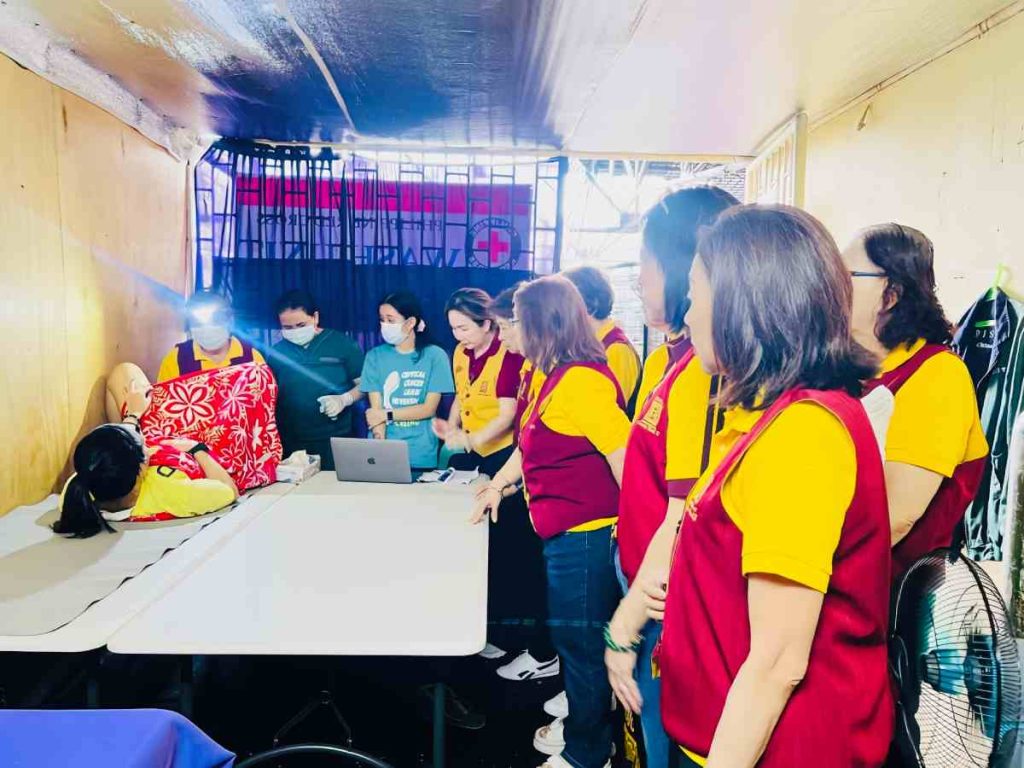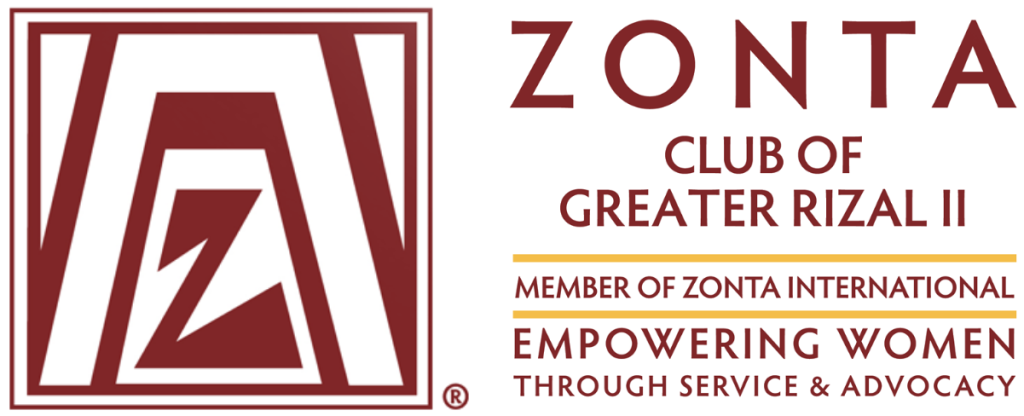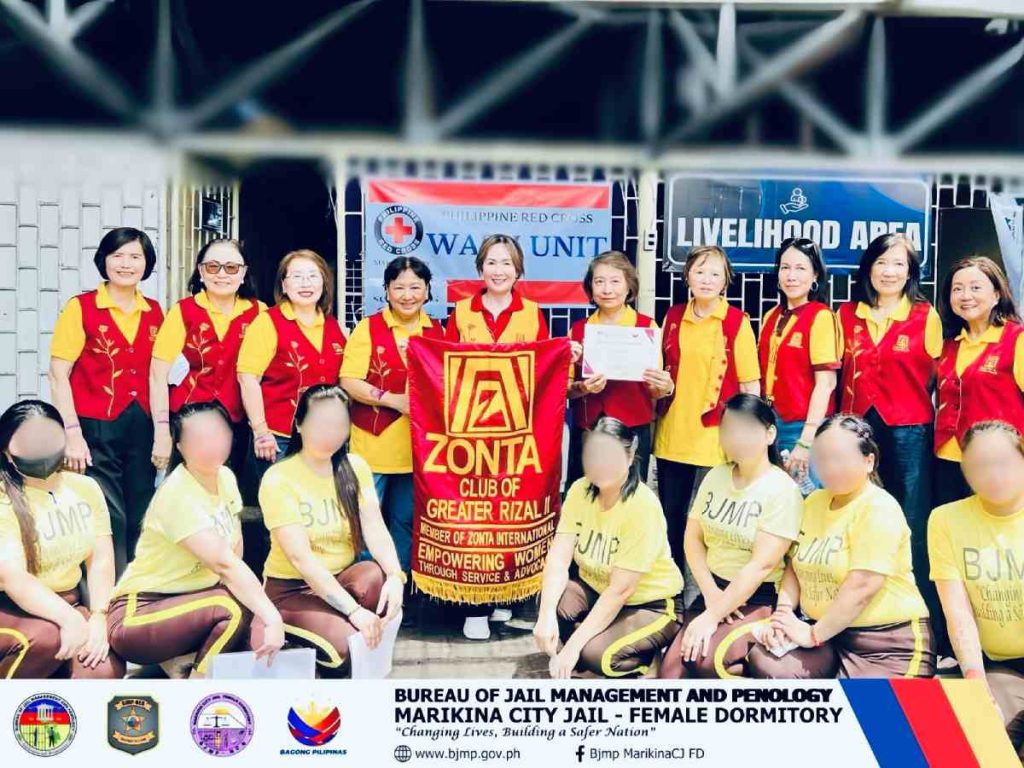Biennium 2024 - 2026, PROJECTS
Behind Bars, Beyond Barriers: How Zonta Club of Greater Manila II is Championing Women’s Health and Equality
On an ordinary weekday morning, high above the Justice Hall Building in Marikina City, a quiet revolution in women’s health unfolded.
At the 6th floor Female Dormitory of the Marikina City Jail, the Zonta Club of Greater Manila II, true to the global mission of Zonta International, brought hope, dignity, and access to healthcare to one of the country’s most underserved populations—persons deprived of liberty (PDLs).

The spotlight of the day was a cervical cancer screening mission, in partnership with End Cervical Cancer Philippines Inc. (CerviQ). But this was not just another medical mission—it was a bold declaration that women’s health matters, regardless of status, circumstance, or confinement.
Gender Equality Isn’t Just a Slogan—It’s a Commitment
Zonta International champions a world where gender equality is a reality. Yet when we examine the burden of cervical cancer, it becomes painfully clear: we are not there yet.

Cervical cancer is a disease that almost exclusively affects women, and disproportionately those who are marginalized—poor, uneducated, and in this case, incarcerated. It is a preventable cancer, yet in the Philippines, 12 women die from it every day. Not because the science doesn’t exist to stop it, but because the systems don’t reach them in time.
Had this disease primarily affected men, would we still be losing 4,000 Filipino women each year to a cancer we know how to prevent and treat? We’ll leave that question hanging in the air, but one cannot help but feel that gender inequality persists not just in opportunities, but in who gets screened, who gets vaccinated, and who gets to live.
Zonta’s work reminds us that real equality means bringing the solutions to the women who need them most—including those behind bars.


A Mission of Compassion, Precision, and Technology
On this day, 42 women were screened for cervical cancer using a breakthrough approach: speculoscope-assisted Visual Inspection with Acetic Acid (VIA). Unlike the traditional naked-eye method, the speculoscope uses a 16MP camera inserted transvaginally—allowing for magnified, high-definition images of the cervix to be captured, reviewed, and evaluated remotely by a physician.
This isn’t just high-tech screening—it’s empowerment. Women can now see the images of their own cervix, understand the findings, and take ownership of their health. The results are immediate, the process dignified, and the approach—revolutionary.

Out of the 42 PDLs screened, a number were identified to have potential signs of cervical dysplasia, necessitating repeat speculoscopy, biopsy, and possible portable thermal ablation treatment. Nearly a quarter of those screened also showed signs of vaginal infection based on the appearance and odor of discharge.
Let that sink in—many of these women had never been screened before. Their symptoms weren’t visible. They didn’t know they were at risk. And had it not been for this mission, they may never have known—until it was too late.
The Bigger Picture: Vaccination, Education, and Prevention
Cervical cancer often comes with no symptoms until it is advanced, usually stage 3 or 4. At that point, treatment becomes more expensive, more painful, and more likely to fail. Which is why prevention is the only truly humane approach.
During the event, education about HPV, cervical cancer, and the importance of early detection was shared. Crucially, HPV vaccination was highlighted as the cornerstone of future prevention.
As we speak of rights, let us remember: every girl deserves the HPV vaccine before she becomes sexually active. Every woman deserves access to screening. Anything less is injustice.
A Full Day of Hope and Healing
But Zonta Club of Greater Manila II didn’t stop at cervical screening. The entire day was filled with activities that sought to restore dignity and promote holistic well-being among the women PDLs.
Together with compassionate partners, the following services were rendered:
-
Medical and dental consultations with free medications
-
Chair massages for relaxation and physical relief
-
Distribution of food packs and hygiene kits for daily needs
-
HIV and dengue awareness sessions conducted by the Philippine Nurses Association – Zone 3
-
Disaster Risk Reduction and Management (DRRM) and climate change education by the Philippine Red Cross – Marikina Chapter
This was more than a medical caravan. It was a community of care—a collaboration of hearts and hands working to uplift lives that society too often forgets.
A Salute to the Champions Behind the Scenes
This initiative was powered by a host of partners and sponsors, all of whom brought this vision to life. Deep thanks go to:
SOGO Cares, Hotel Sogo Santolan Branch, Genecca Pharmacy, Dr. Allan Tamayo, Dr. Jasmin Fetiza, Philippine Nurses Association – Zone 3, Eagles, Metro Business Titans Lions Club, Ayala Amity Centennial Lions Club, Dentistry Advocacy, Philippine Eagles Media Bureau, Zonta Club of Greater Rizal II, Holy Name Society – OLA Parish Unit Marikina City, PRC Marikina Chapter, and ReACh Project.
Your generosity did more than deliver services—it delivered hope.

Final Thoughts: This Is What Equality Looks Like
Zonta’s mission doesn’t exist in a vacuum. It lives in places like the Marikina Jail, in the hearts of women who’ve been silenced, forgotten, or overlooked.
Let’s face it—we cannot talk about gender equality without talking about cervical cancer. Because what greater inequality is there than dying from a preventable disease simply because you’re a woman?
Women are the anchors of our families. They hold households together, raise children, support partners, and nurture communities. They deserve to be healthy. They deserve to be seen. And they deserve access to every life-saving tool modern medicine can offer.
The Zonta Club of Greater Manila II showed us that it is not only possible—it is necessary. One jail, one cervix, one woman at a time.
The fight continues, but the future is brighter—because women like you choose to care.

